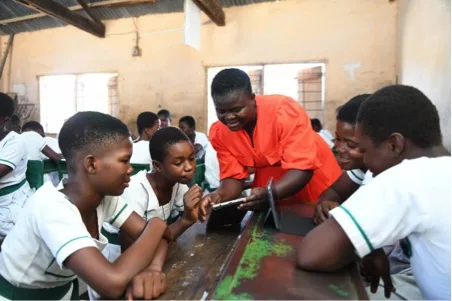|
Getting your Trinity Audio player ready...
|
When 14-year-old Aba returned to school after nearly dropping out due to financial hardship and domestic pressure, she was not sure she belonged. But that changed when Fati – a soft-spoken young woman in a CAMFED T-shirt – entered her classroom. Fati, a former student from the same community, was now a Learner Guide, and her weekly sessions on the “My Better World” curriculum became a turning point in Aba’s life.
Aba’s experience mirrors that of thousands of students across Ghana who have found renewed hope, purpose and academic support through CAMFED’s Learner Guide Program – an initiative designed to complement government efforts in improving school attendance, performance, and life outcomes for students, particularly girls, in under-resourced areas.
Mentorship as a Support Pillar
Mentoring is widely recognised as a critical support service that nurtures the educational, vocational and psychological potential of learners. In response to the multifaceted needs of students – particularly as they mature and navigate cognitive, social, emotional and behavioural transitions – CAMFED launched the Learner Guide Program to offer systematic and comprehensive mentoring support across Ghana.
Through its network of young women supported by CAMFED, known as the CAMFED Association (CAMA), the organisation identifies recent school graduates who are passionate about giving back to their communities. These CAMA members volunteer as Learner Guides in their local junior and senior high schools, offering guidance and mentorship while facilitating a peer-led, skills-based learning environment.
Pilot and Scale-Up
The Learner Guide Program was first piloted with funding from the Queen’s Trust in 18 senior high schools across 11 districts: Gomoa West, Abura Asebu Kwamankese, Mfantseman, Tamale Metro, West Mamprusi, West Gonja, Bole, Chereponi, Yendi, Bongo and East Mamprusi. In this phase, 540 Learner Guides reached 21,683 students with weekly sessions designed to improve educational outcomes and support post-school transitions.
Since then, the program has expanded to 847 schools across CAMFED’s 38 operational districts in the Northern, Northeast, Savannah, Upper East, Upper West, Bono, Ashanti, Eastern, Western, Greater Accra, and Central Regions. Under the program, Learner Guides dedicate 12 to 18 months of voluntary service to conduct weekly sessions using the ‘My Better World’ (MBW) curriculum, a tailored resource that enhances learners’ aptitude for schooling, self-knowledge and future prospects.
Enhancing the Learning Environment
The MBW curriculum covers life skills, learner-centred approaches, leadership development, child protection and classroom management. Learner Guides are trained to deliver both group sessions and individual psychosocial support. Their responsibilities include coordinating study groups, reinforcing home-school links, and promoting child protection through active collaboration with school management, parents and local authorities. The holistic support structure also involves trained Teacher Mentors- currently numbering 416 – who are embedded in schools to provide psychosocial and academic support and to reinforce the lessons of the MBW curriculum.
The Impact So Far
From 2024 to date, the program has seen the recruitment and training of 2,229 Learner Guides and has reached 68,442 learners across Ghana. An estimated 35,000 girls have received direct mentorship, creating pathways to improved attendance, retention and academic progression.
For Learner Guides themselves, the program offers significant personal and professional growth. It serves as a pathway to employment, formal teacher training, tertiary education, and enhanced leadership skills. Many Guides report improved confidence and agency over life decisions.
The schools involved have seen increased female representation, greater student engagement, and the introduction of dynamic, learner-centred classroom methods. On a systemic level, the initiative contributes to narrowing the gender gap in education and reshaping social norms around girls’ schooling.
Towards National Integration
In light of its alignment with Ghana’s Education Strategic Plan (2018–2030) and the new senior high school curriculum, CAMFED is working with key government institutions including the Ministry of Education, Ghana Education Service, and the National Service Authority to integrate the Learner Guide Program into national education systems.
Under CAMFED’s current strategic plan (2024–2029), this collaboration aims to make the benefits of the Learner Guide model accessible to all learners across the country. The integration will also support national and global education commitments, particularly Sustainable Development Goal 4, which calls for inclusive and equitable quality education and lifelong learning opportunities for all.
A Lifeline for Learners
For students like Aba, the presence of a Learner Guide like Fati has made all the difference. It has transformed her experience of school from a place of uncertainty into a space of hope and belonging. In every MBW session, study group, and one-on-one conversation, the Learner Guide Program is not just mentoring students – it is changing lives, one classroom at a time.






